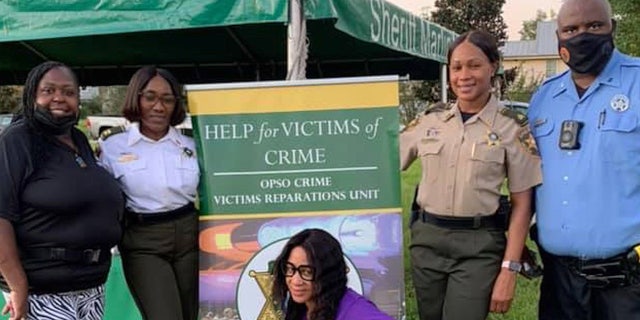Amid surging homicides in New Orleans, this woman is often one of the first on scene
NEW ORLEANS – Sometimes the sadness gets too heavy for Tamara Jackson, a victim advocate in a city that’s been called the nation’s murder capital.
“I just have to turn off my feelings,” Jackson said. “If you don’t, I’ll be emotionally drained, and I have to make myself valuable and useful for the next family.”
NEW ORLEANS RESIDENTS WARN ‘DON’T SIT IN YOUR CAR’ AS CARJACKINGS SPIKE A SHOCKING 165%
More than 50 people have been killed in New Orleans so far this year. Three died in a car chase and shootout. A 15-year-old girl was shot through a wall during a sleepover. Two siblings were gunned down at an intersection less than a year after their younger brother was also shot to death.
Jackson works for the coroner’s office and is dispatched to the scene of as many homicides as she can get to. She comforts victims’ loved ones and helps guide them through the legal system.
“Their grief and trauma needs to be addressed,” she said. “And I’m a therapist. So even though I’m responding, I’m also able to do that crisis intervention at the time when it’s most needed.”
Jackson knows what it’s like to be in the victims’ families shoes — her father was murdered almost 23 years ago.
“I was one of those people,” she said. “So I hate to say I understand, because every situation is different … but I do have some working knowledge of how that can be, because I felt that way.”
WHY THIS WOMAN IS ONE OF THE FIRST AT THE CRIME SCENE. WATCH:
WATCH MORE FOX NEWS DIGITAL ORIGINALS HERE
Violent crime has spiked dramatically in New Orleans over the past few years. The city had the most homicides per capita among major U.S. cities in September, briefly earning it the title of the nation’s murder capital. Just three years previously, New Orleans recorded its lowest number of homicides — 119 — in nearly half a century.
“We don’t have the population we had pre-Katrina, and we still experience in tragedy after tragedy,” Jackson said. “Violence is still being perpetuated and folks are still dying.”
Grieving families may have questions about the crime that police can’t answer, Jackson said. She sees her job as bridging the gap between two vital partners in the investigation.
“I can gather information from the families and share with law enforcement, and vice versa,” she said. “The family are key allies because they know [the victim], good or bad.”
NEW ORLEANS MAYOR RECALL ORGANIZERS SCORE DEAL THAT COULD LOWER SIGNATURE REQUIREMENT
Jackson is also the executive director of Silence is Violence, a community organization formed in 2007 to promote safety and youth engagement in New Orleans.
She said she has built valuable relationships within law enforcement that she didn’t have 16 years ago. But she also faces bureaucratic hurdles when working with the government. Her brief stint with the mayor’s Office of Gun Violence Prevention was put on hiatus during a funding freeze, Jackson said.
“The community is going to be there first before law enforcement,” she said. “So we need to build stronger communities, healthier communities.”
THE PERFECT STORM: HOW CRIME AND INFLATION SURGES ARE HAMMERING A DECADES-OLD NEW ORLEANS RESTAURANT
On a good day, there are no homicides for Jackson to respond to. Those days are getting fewer and farther between.
“I’ve had days where we’ve had six [homicides], and all of us are moving the same people from one scene to the next,” she said. “We don’t have enough people where we can dispatch and have a whole new crew respond.”

Jackson has a ritual after dealing with a particularly difficult scene. She’ll sit in her SUV, take a minute to breathe, and say a prayer.
But another family is waiting, so once she’s recharged and ready to give the job “110% again,” Jackson shifts her car into drive and heads to the next crime scene where she’ll reunite with the coroner and homicide detective.
And they’ll do it all again.
Read the full article Here


